2016 Olympic GamesJul 18, 2016
McLaren Report Details Systemic Doping in Russian Sports
McLaren Report Details Systemic Doping in Russian Sports
With the start of the 2016 Olympic Games just a month away, the World Anti-Doping Agency (WADA) released further evidence today of Russia's widespread, stat
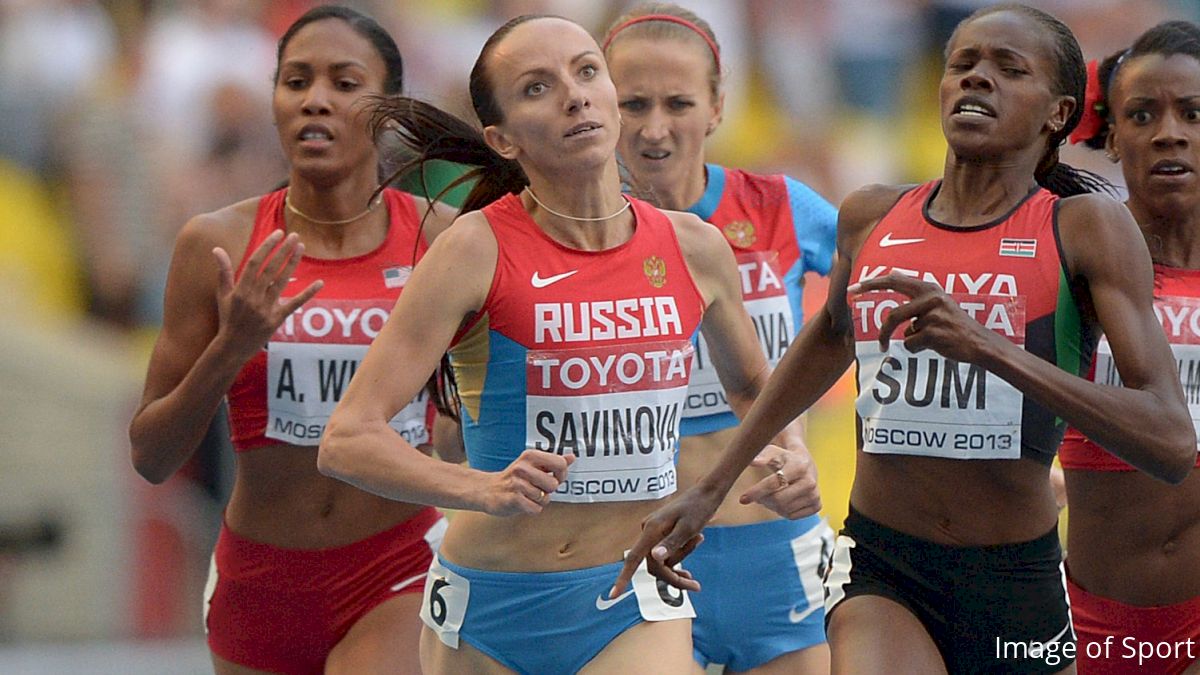
With the start of the 2016 Olympic Games just a month away, the World Anti-Doping Agency (WADA) released further evidence today of Russia's widespread, state-sponsored doping as a potential call to action for sport governing bodies to ban Russia entirely from competing in Rio.
The independent investigation helmed by Canadian professor Richard McLaren focuses on Russian athletes and their test samples from the 2014 Winter Olympics in Sochi. The report was commissioned after a CBS "60 Minutes" expose in which Russian athletes Vitaly Stepanova and his wife Yuliyana admitted to taking performance enhancing drugs (PEDs).
The report alleges the Moscow laboratory operated within a state-dictated failsafe system and that the Sochi laboratory was guilty of sample-swapping to allow doping athletes to compete at the Sochi Games. This was all spearheaded by the Ministry of Sport, which worked with the Russian Federal Security Service (FSB) to protect Russia's best athletes.
The findings were not limited to the Russian track and field team, which was already banned from competing at the Rio Games. There were positive tests in every sport, including wrestling, weightlifting, cycling, and swimming. According to the report, 54 percent of athletes had a positive sample replaced by order of the Russian Ministry of Sport. This in sharp contrast to only 12 percent of foreign athletes.
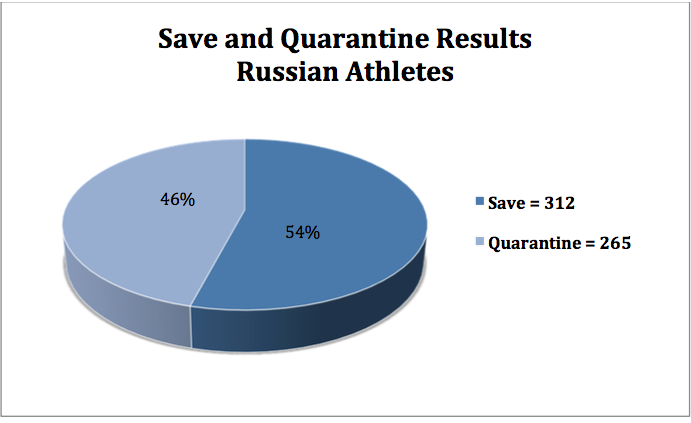
"The system was set up following the 2010 Olympics, and was in place until 2014," McLaren said. "It allowed the transformation of a positive result to a negative one, overseen by the Deputy Minister of Sport."
The Deputy Minister of Sport, Yuri Nagornykh, decided who would benefit from a cover-up and who would not be protected. The sample-swapping system in place for the Sochi games used a "mouse hole" in the lab.
Athletes would seal the bottles, complete the doping control form, and subsequently take a picture of the bottle sample number. This information was relayed to Dr. Rodchenkov, who would ensure the urine sample would be swapped out of the bottle.
These samples were given to an FSB agent, who was given security clearance into the laboratory as a sewer engineer. He'd then replace the tainted samples with the athlete's clean urine from the FSB building.
The precise method the FSB used to open the bottles is unknown, but it has been established that the caps can be removed and reused later.
These findings paint a very grim picture in regards to Russian sports. Additional testing was called for the samples from the 2012 Games in London. Eight Russian athlete "A" samples tested positive for Oral Turinabol that had previously found to contain no outside chemicals during testing four years ago.
IOC President Thomas Bach has said, "The IOC will not hesitate to take the toughest sanctions available against any individual or organization implicated."
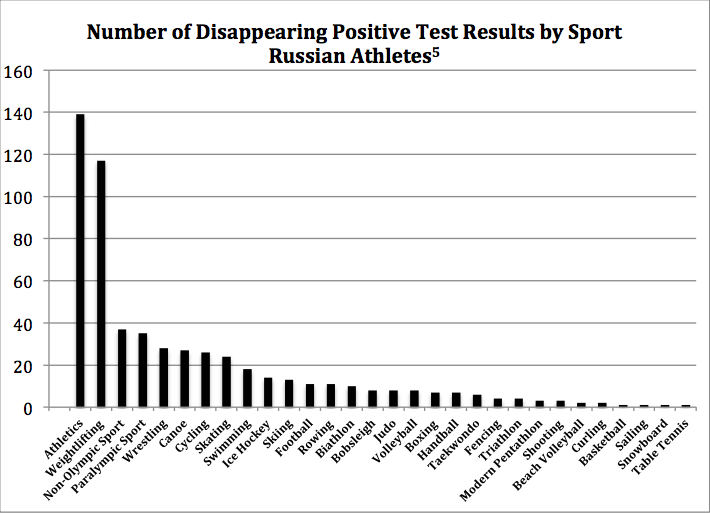
The McClaren report is just the latest in a litany of mounting accusations against Russia. In 2014, a German documentary led WADA to recommend banning Russia's track and field athletes. That was quickly followed by the International Association of Athletics Federations (IAAF) instituting the ban in November 2015, and upholding it in June, which effectively removed Russia's track and field team from the 2016 Olympic Games.
Now that the report's findings have been released, it's likely that other countries will call for Russia to be banned entirely from this summer's Olympics. WADA does not have the ability to ban athletes, but they can recommend that governing bodies take action. The IAAF, which governs international track and field, has already banned its Russian athletes from competing in Rio. The results from this report, which further details other sports' infractions, may trigger additional governing bodies to do the same.
The independent investigation helmed by Canadian professor Richard McLaren focuses on Russian athletes and their test samples from the 2014 Winter Olympics in Sochi. The report was commissioned after a CBS "60 Minutes" expose in which Russian athletes Vitaly Stepanova and his wife Yuliyana admitted to taking performance enhancing drugs (PEDs).
The report alleges the Moscow laboratory operated within a state-dictated failsafe system and that the Sochi laboratory was guilty of sample-swapping to allow doping athletes to compete at the Sochi Games. This was all spearheaded by the Ministry of Sport, which worked with the Russian Federal Security Service (FSB) to protect Russia's best athletes.
The findings were not limited to the Russian track and field team, which was already banned from competing at the Rio Games. There were positive tests in every sport, including wrestling, weightlifting, cycling, and swimming. According to the report, 54 percent of athletes had a positive sample replaced by order of the Russian Ministry of Sport. This in sharp contrast to only 12 percent of foreign athletes.

"The system was set up following the 2010 Olympics, and was in place until 2014," McLaren said. "It allowed the transformation of a positive result to a negative one, overseen by the Deputy Minister of Sport."
The Deputy Minister of Sport, Yuri Nagornykh, decided who would benefit from a cover-up and who would not be protected. The sample-swapping system in place for the Sochi games used a "mouse hole" in the lab.
Athletes would seal the bottles, complete the doping control form, and subsequently take a picture of the bottle sample number. This information was relayed to Dr. Rodchenkov, who would ensure the urine sample would be swapped out of the bottle.
These samples were given to an FSB agent, who was given security clearance into the laboratory as a sewer engineer. He'd then replace the tainted samples with the athlete's clean urine from the FSB building.
The precise method the FSB used to open the bottles is unknown, but it has been established that the caps can be removed and reused later.
These findings paint a very grim picture in regards to Russian sports. Additional testing was called for the samples from the 2012 Games in London. Eight Russian athlete "A" samples tested positive for Oral Turinabol that had previously found to contain no outside chemicals during testing four years ago.
IOC President Thomas Bach has said, "The IOC will not hesitate to take the toughest sanctions available against any individual or organization implicated."

The McClaren report is just the latest in a litany of mounting accusations against Russia. In 2014, a German documentary led WADA to recommend banning Russia's track and field athletes. That was quickly followed by the International Association of Athletics Federations (IAAF) instituting the ban in November 2015, and upholding it in June, which effectively removed Russia's track and field team from the 2016 Olympic Games.
Now that the report's findings have been released, it's likely that other countries will call for Russia to be banned entirely from this summer's Olympics. WADA does not have the ability to ban athletes, but they can recommend that governing bodies take action. The IAAF, which governs international track and field, has already banned its Russian athletes from competing in Rio. The results from this report, which further details other sports' infractions, may trigger additional governing bodies to do the same.
Related Content
 Replay: UIL Region 4-5A and Region 4-6A | Apr 19 @ 9 AM
Replay: UIL Region 4-5A and Region 4-6A | Apr 19 @ 9 AMApr 19, 2024
 Rai Benjamin, Athing Mu And Sydney McLaughlin-Levrone Headline Mt. SAC
Rai Benjamin, Athing Mu And Sydney McLaughlin-Levrone Headline Mt. SACApr 19, 2024
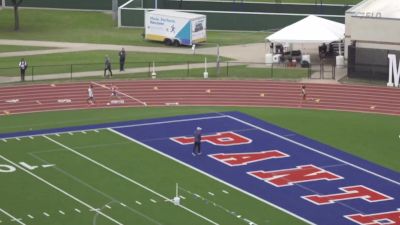 Replay: UIL Region 2-6A Region 3-3A | Apr 19 @ 9 AM
Replay: UIL Region 2-6A Region 3-3A | Apr 19 @ 9 AMApr 19, 2024
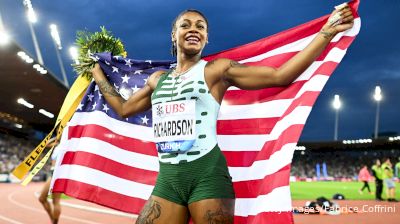 Diamond League Xiamen 2024 To Include USA Track Star Sha'Carri Richardson
Diamond League Xiamen 2024 To Include USA Track Star Sha'Carri RichardsonApr 19, 2024
 Marathon Master's World Record-Holder Kenenisa Bekele Excited For Return To London Marathon
Marathon Master's World Record-Holder Kenenisa Bekele Excited For Return To London MarathonApr 19, 2024
 Tamirat Tola Is Confident In His Training Heading Into London Marathon
Tamirat Tola Is Confident In His Training Heading Into London MarathonApr 19, 2024
 Leul Gebresilase Prepared For 2024 TCS London Marathon
Leul Gebresilase Prepared For 2024 TCS London MarathonApr 19, 2024
 Mic'd Up With Ritz At The TEN
Mic'd Up With Ritz At The TENApr 19, 2024
 FloSports Recognized Globally By International Sports Press Association
FloSports Recognized Globally By International Sports Press AssociationApr 18, 2024